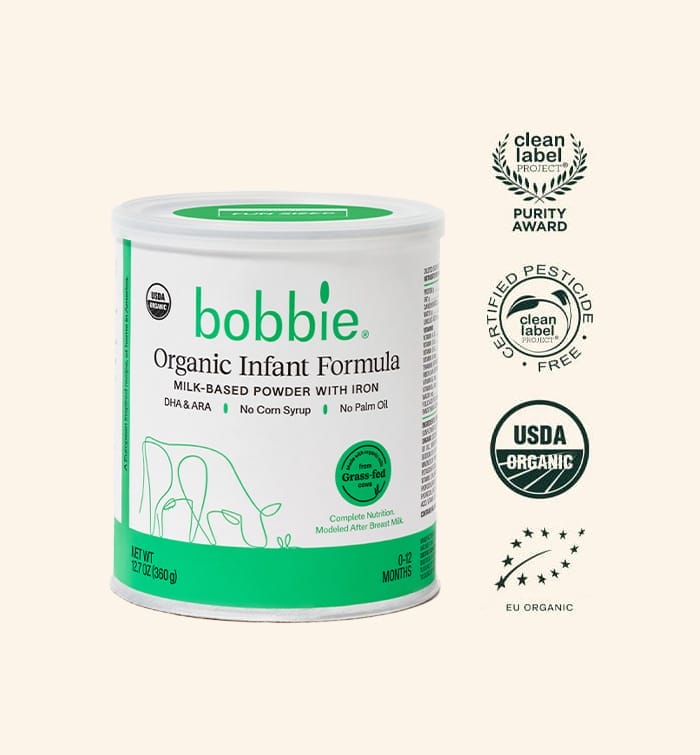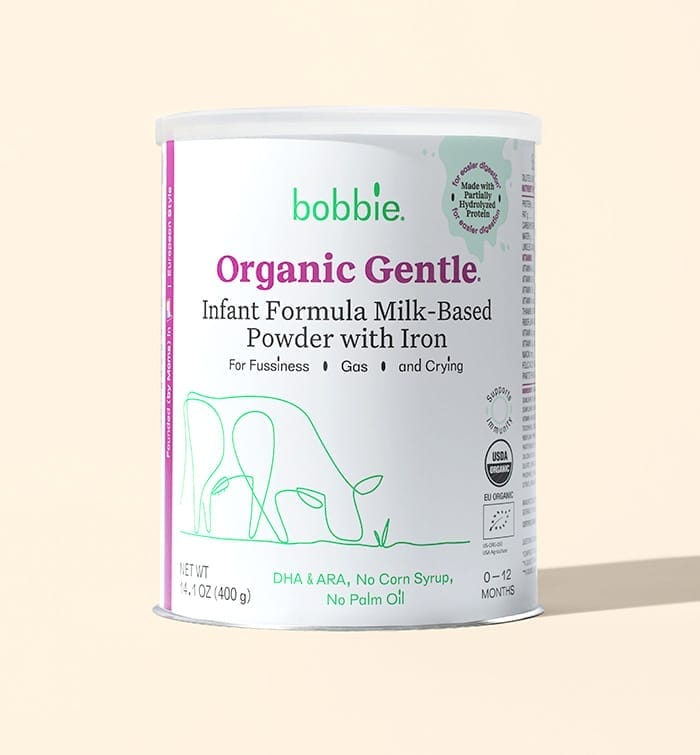We are proud to say that these posts are not sponsored. Our editorial team of Bobbie moms and writers personally select each featured product. If you buy something through our links, we may earn an affiliate commission, at no cost to you.
Is DHA good or bad? What about DHA in baby formula? So many questions, and we know as a parent, your time is limited. We hear a lot about the differences between US and EU policies when it comes to DHA in baby formula. So, let’s jump right in and learn a little bit about what exactly you’ll find in these formulas and why DHA is important.
What is DHA?
DHA is also known as the docosahexaenoic acid. This complicated sounding term is defined as an essential fatty acid that is supposed to aid in the development of newborns.
Luckily, it happens to be present in breastmilk, and it’s been known to be added to a ton of different infant formulas. More specifically, it’s been known to also help improve vision as well as brain development. And we all know this is super important for the growth of your baby!
Not only is DHA given to babies, but it’s also been given to toddlers to ensure that the proper development is definitely reinforced.

Shop Bobbie Organic Infant Formula
Bobbie Organic Infant Formula is a USDA Organic, EU-style infant formula that meets all FDA requirements. It is a complete nutrition milk-based powder modeled after breast milk and is easy on tummies. It is non-GMO and doesn't have corn syrup, palm oil, or maltodextrin. Learn more about Bobbie.
Is ARA similar to DHA?
Similar to DHA, ARA can be found right behind DHA when it comes to breastmilk and the addition in formulas.
ARA is also considered to be a fatty acid, and it’s not only found in formulas for babies but also in other foods such as fish and eggs. Both work to help that same vision and brain development.
If anything, ARA and DHA are the perfect pair for reinforcing your baby’s health, today and in the future!
What’s the difference between baby formula from Europe and the U.S.?
Now, when added to different formulas from other countries, let’s see how the two compare. Both the U.S. and Europe have infant formula regulations that are required to be met, and so the development of formulas is done a little differently.
So, what are the main differences between how Europe and the U.S. allow baby formulas to be sold? Let’s take a look.
European Baby Formula
First, let’s talk about the regulations used in the EU around infant formula.
To give your babies the protein they need, animal-based milks are primarily used in both the EU and US. However, there’s a wider selection. The big difference in the EU is that they have a goat milk option written into the regulation. There is no goat milk based infant formula legally sold in the US. In fact, Europe was the first to include goat milk in formula, which some experts believe to be healthier in terms of the protein it provides.
The European Union (EU) is also known to have different, and sometimes stricter, regulations than the Food and Drug Administration (FDA) in America.

Shop Bobbie Organic Gentle Infant Formula
Bobbie Organic Gentle is the only baby formula in the U.S. market that offers 100% partially-hydrolyzed whey protein and 100% lactose as the carbohydrate source. Our gentle baby formula is easy on sensitive tummies to help alleviate fussiness and gas. Learn more about Bobbie Gentle.
American Baby Formula
Now, let’s take a look into how American formula compares.
The majority of infant formulas are cow’s milk based. For those who happen to be lactose intolerant or have an allergy to the proteins found in milk though, there are also a few formulas that incorporate soy.
Europe requires DHA to be added to baby formula
In terms of DHA, the main difference between the EU when compared to the U.S. is that the EU requires all baby formulas to have DHA added to them.
This is because they believe that this particular fatty acid helps your baby’s nourishment. And if that’s the case, we’re happy that they’re looking out for our little ones!
Since this essential ingredient helps with the vital parts of infant development, such as the eyes and brain, why not add it to every formula? Plus, it’s already present in breast milk naturally.
U.S. options for DHA in baby formula
However, the U.S. allows DHA to be an option in their formulas – but it’s not a mandatory ingredient.
We definitely understand that not every parent is keen on wanting this ingredient added to the mix, and that’s completely ok, too.
According to the FDA, they do recognize the power and influence of this helpful ingredient, making it known they think it’s an important element. In fact, in 2002 they allowed DHA to be added to formulas for the first time as a secure regulation.
Want DHA in baby formula?
Although the U.S. and EU both use DHA in their formulas, you should never feel obligated or pressured to use them with your baby. It’s completely understandable to have concerns about a certain ingredient, and maybe your baby will thrive just as well, if not better without it.
The decision should be completely your own, so never feel as if the opinion of another should trump your own.
After all, you know your infant better than anyone, so it’s best for you to make decisions on their behalf for strong support and development.
Our final thoughts on baby formula and DHA
With all of the health benefits and developmental assistance this fatty acid yields, we believe it can certainly do a lot of good for your baby. After all, it’s well known for aiding in the development of your baby’s eyes and brain specifically, which is great!
However, we completely understand if you want to prioritize different ingredients in your baby’s nutritional mixture. In the end, as a parent, your opinion on DHA is what matters most when it comes to your baby’s formula choices.
Sources:
https://www.neocate.com/living-with-food-allergies-blog/dha-ara-infant-formula

